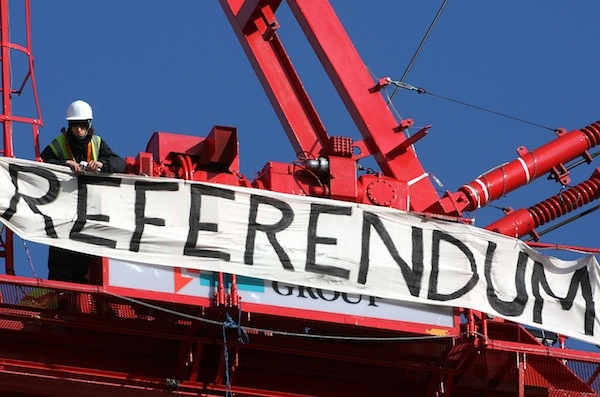The cross-party ‘Vote Leave’ campaign launches today, with an impressive list of backers from politics and business. It is run by Matthew Elliot and Dominic Cummings, and has MPs from across the spectrum supporting it. This is what it needs to do next:
1. Get the official designation from the Electoral Commission.
Vote Leave is the favourite to get the Commission’s funding, free mailing and campaign broadcasts. It is trying to underline that it is the better of the two campaigns – the other being Arron Banks’ Leave EU campaign – by showing off how many people from across the political spectrum it represents.
2. Work out what to do with Nigel Farage.
Farage is one of the key figures who managed to make this referendum happen. His achievement in successfully agitating for the vote should not be dismissed. But he is a divisive figure, who polls show puts voters off the arguments made by the eurosceptics. His achievement in the 2015 election in getting 12.6 per cent of the vote is often forgotten because it only returned Ukip one seat – and the MP representing that one seat is Douglas Carswell, who is on the parliamentary committee for the Vote Leave campaign, as he believes this is the one that will make the case most effectively. Plus 12.6 per cent of the vote isn’t really what the ‘Out’ campaigners are looking for. They need over 50 per cent in the referendum, and worry that Farage will make that more difficult when he is very good at appealing to one section of the electorate, but not many others.
But because Farage does have a strong appeal to that section, and because Ukip’s ground troops are quite enthusiastic, the party argues that it should be a part of the Out movement. The question is whether Farage campaigning at all damages the overall cause, or whether he can be just one element. And is that one element necessary? Those who vote Ukip are already energised to turn out and vote to leave. The campaign needs to focus on everyone else, not them.
3. Avoid a People’s Front of Judea situation.
Two campaigns with similar names and a lot of bickering in between isn’t a great look for those trying to press the case for Brexit. A spread of voices might help but infighting, confusion and mixed messages will put voters off. Vote Leave has tried not to respond to the rather noisier Leave EU campaign. But both want designation, and the fight between Douglas Carswell and Arron Banks at the Ukip conference hardly gave the impression of an organised and coherent movement.
Lord Harris pulled out of the Elliot/Cummings campaign as soon as it launched, saying ‘this was not what I signed up to’, which is surprising given it was hardly a secret that this group was going to become the Out campaign. It has enough names for this not to make much of a dent. But no campaign wants many people pulling out in confusion.
4. Attract those who are waiting to see what Cameron’s renegotiation brings.
The Vote Leave launch included an insistence from Conservatives for Britain chair Steve Baker that while his group supports the renegotiation, ‘we also support the creation of a professional cross-party campaign that can fight the referendum if the EU does not give the PM fundamental change. Such a campaign cannot be built in a few weeks. Work must start now’.
Some Tories are already committed to leaving the EU, but many others are genuinely interested in what Cameron might secure from his renegotiation. If they are dissatisfied, then the Vote Leave campaign must be sufficiently attractive for them to join. This is even more important for those Tories in the Cabinet who have made very eurosceptic noises in the past. I understand that a number of them are mulling whether they’ll ever come out in favour of Out if the campaign to leave looks as though it is having a tough time. If you are ambitious and would like to have a shot at leading the Tory party one day, you don’t want to look like a loser. And joining a campaign that is on the losing side might just do that for you. So keep quiet, especially if the Prime Minister refuses to give Cabinet Ministers a free vote, and keep your options open. Vote Leave needs sufficient momentum to make jumping on board attractive for those who want a shot at power.
 The Spectator is hosting an evening discussion ‘Is the EU bad for business?’ at 7pm on Tuesday 20 October at The Royal College of Surgeons, WC2. Speakers include: Dominic Cummings, director of the ‘No’ campaign and Will Straw, executive director of the ‘Yes to Europe’ campaign and is chaired by Andrew Neil. For tickets and further information, click here.
The Spectator is hosting an evening discussion ‘Is the EU bad for business?’ at 7pm on Tuesday 20 October at The Royal College of Surgeons, WC2. Speakers include: Dominic Cummings, director of the ‘No’ campaign and Will Straw, executive director of the ‘Yes to Europe’ campaign and is chaired by Andrew Neil. For tickets and further information, click here.







Comments